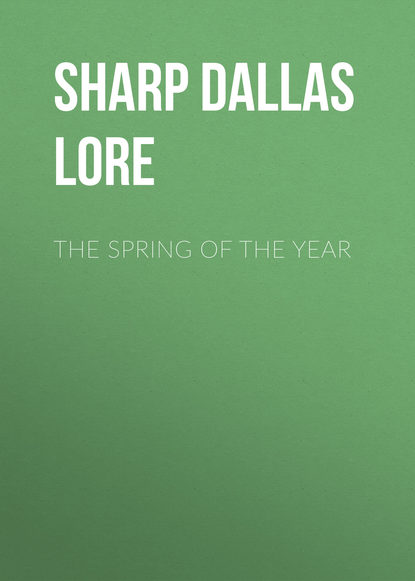По всем вопросам обращайтесь на: info@litportal.ru
(©) 2003-2024.
✖
The Spring of the Year
Настройки чтения
Размер шрифта
Высота строк
Поля
Go down to your nearest meadow – a meadow near a swampy piece of woods is best – and here, along the bank of the meadow stream, wait in the chilly twilight for the speank, speank, or the peent, peent, from the grass – the signal that the song is about to begin.
VI
One of the dreadful – positively dreadful – sounds of the late spring that I hear day in and day out is the gobbling, strangling, ghastly cries of young crows feeding. You will surely think something is being murdered. The crying of a hungry baby is musical in comparison. But it is a good sound to hear, for it reminds one of the babes in the woods – that a new generation of birds is being brought through from babyhood to gladden the world. It is a tender sound! The year is still young.
VII
You should hear the hum of the honey-bees on a fresh May day in an apple tree that is just coming into perfect bloom. The enchanting loveless of the pink and white world of blossoms is enough to make one forget to listen to the hum-hum-hum-humming-ing-ing-ing-ing of the excited bees. But hear their myriad wings, fanning the perfume into the air and filling the sunshine with the music of work. The whir, the hum of labor – of a busy factory, of a great steamship dock – is always music to those who know the blessedness of work; but it takes that knowledge, and a good deal of imagination besides, to hear the music in it. Not so with the bees. The season, the day, the colors, and perfumes – they are the song; the wings are only the million-stringed æolian upon which the song is played.
VIII
You should hear the grass grow. What! I repeat, you should hear the grass grow. I have a friend, a sound and sensible man, but a lover of the out-of-doors, who says he can hear it grow. But perhaps it is the soft stir of the working earthworms that he hears. Try it. Go out alone one of these April nights; select a green pasture with a slope to the south, at least a mile from any house, or railroad; lay your ear flat upon the grass, listen without a move for ten minutes. You hear something – or do you feel it? Is it the reaching up of the grass? is it the stir of the earthworms? is it the pulse of the throbbing universe? or is it your own throbbing pulse? It is all of these, I think; call it the heart of the grass beating in every tiny living blade, if you wish to. You should listen to hear the grass grow.
IX
The fires have gone out on the open hearth. Listen early in the morning and toward evening for the rumbling, the small, muffled thunder, of the chimney swallows, as they come down from the open sky on their wonderful wings. Don’t be frightened. It isn’t Santa Claus this time of year; nor is it the Old Nick! The smothered thunder is caused by the rapid beating of the swallows’ wings on the air in the narrow chimney-flue, as the birds settle down from the top of the chimney and hover over their nests. Stick your head into the fireplace and look up! Don’t smoke the precious lodgers out, no matter how much racket they make.
X
Hurry out while the last drops of your first May thunder-shower are still falling and listen to the robins singing from the tops of the trees. Their liquid songs are as fresh as the shower, as if the raindrops in falling were running down from the trees in song – as indeed they are in the overflowing trout-brook. Go out and listen, and write a better poem than this one that I wrote the other afternoon when listening to the birds in our first spring shower: —
The warm rain drops aslant the sun
And in the rain the robins sing;
Across the creek in twos and troops,
The hawking swifts and swallows wing.
The air is sweet with apple bloom,
And sweet the laid dust down the lane,
The meadow’s marge of calamus,
And sweet the robins in the rain.
O greening time of bloom and song!
O fragrant days of tender pain!
The wet, the warm, the sweet young days
With robins singing in the rain.
CHAPTER XI
TURTLE EGGS FOR AGASSIZ
I took down, recently, from the shelves of a great public library, the four volumes of Agassiz’s “Contributions to the Natural History of the United States.” I doubt if anybody but the charwoman, with her duster, had touched those volumes for twenty-five years. They are a monumental work, the fruit of vast and heroic labors, with colored plates on stone, showing the turtles of the United States, and their life-history. The work was published more than half a century ago, but it looked old beyond its years – massive, heavy, weathered, as if dug from the rocks; and I soon turned with a sigh from the weary learning of its plates and diagrams to look at the preface.
Then, reading down through the catalogue of human names and of thanks for help received, I came to a sentence beginning: —
“In New England I have myself collected largely; but I have also received valuable contributions from the late Rev. Zadoc Thompson of Burlington; … from Mr. D. Henry Thoreau of Concord; … and from Mr. J. W. P. Jenks of Middleboro.” And then it hastens on with the thanks in order to get to the turtles, as if turtles were the one and only thing of real importance in all the world.
Turtles are important – interesting; so is the late Rev. Zadoc Thompson of Burlington. Indeed any reverend gentleman who would catch turtles for Agassiz must have been interesting. If Agassiz had only put a chapter into his turtle book about him! and as for the Mr. Jenks of Middleboro (at the end of the quotation) I know that he was interesting; for years later, he was an old college professor of mine. He told me some of the particulars of his turtle contributions, particulars which Agassiz should have found a place for in his big book. The preface says merely that this gentleman sent turtles to Cambridge by the thousands – brief and scanty recognition. For that is not the only thing this gentleman did. On one occasion he sent, not turtles, but turtle eggs to Cambridge —brought them, I should say; and all there is to show for it, so far as I could discover, is a small drawing of a bit of one of the eggs!
Of course, Agassiz wanted to make that drawing, and had to have a fresh turtle egg to draw it from. He had to have it, and he got it. A great man, when he wants a certain turtle egg, at a certain time, always gets it, for he gets some one else to get it for him. I am glad he got it. But what makes me sad and impatient is that he did not think it worth while to tell us about the getting of it.
It would seem, naturally, that there could be nothing unusual or interesting about the getting of turtle eggs when you want them. Nothing at all, if you should chance to want the eggs as you chance to find them. So with anything else. But if you want turtle eggs when you want them, and are bound to have them, then you must – get Mr. Jenks, or somebody else to get them for you.
Agassiz wanted those turtle eggs when he wanted them – not a minute over three hours from the minute they were laid. Yet even that does not seem exacting, hardly more difficult than the getting of hens’ eggs only three hours old. Just so, provided the professor could have had his private turtle-coop in Harvard College Yard; and provided he could have made his turtles lay. But turtles will not respond, like hens, to meat-scraps and the warm mash. The professor’s problem was not to get from a mud turtle’s nest in the back yard to his work-table in the laboratory; but to get from the laboratory in Cambridge to some pond when the turtles were laying, and back to the laboratory within the limited time. And this might have called for nice and discriminating work – as it did.
Agassiz had been engaged for a long time upon his “Contributions.” He had brought the great work nearly to a finish. It was, indeed, finished but for one small yet very important bit of observation: he had carried the turtle egg through every stage of its development with the single exception of one – the very earliest. That beginning stage had brought the “Contributions” to a halt. To get eggs that were fresh enough to show the incubation at this period had been impossible.
There were several ways that Agassiz might have proceeded: he might have got a leave of absence for the spring term, taken his laboratory to some pond inhabited by turtles, and there camped until he should catch the reptile digging out her nest. But there were difficulties in all of that – as those who are college professors and naturalists know. As this was quite out of the question, he did the easiest thing – asked Mr. Jenks of Middleboro to get him the eggs. Mr. Jenks got them. Agassiz knew all about his getting of them; and I say the strange and irritating thing is, that Agassiz did not think it worth while to tell us about it, at least in the preface to his monumental work.
It was many years later that Mr. Jenks, then a gray-haired college professor, told me how he got those eggs to Agassiz.
“I was principal of an academy, during my younger years,” he began, “and was busy one day with my classes, when a large man suddenly filled the doorway of the room, smiled to the four corners of the room, and called out with a big, quick voice that he was Professor Agassiz.
“Of course he was. I knew it, even before he had had time to shout it to me across the room.
“Would I get him some turtle eggs? he called. Yes, I would. And would I get them to Cambridge within three hours from the time they were laid? Yes, I would. And I did. And it was worth the doing. But I did it only once.
“When I promised Agassiz those eggs, I knew where I was going to get them. I had got turtle eggs there before – at a particular patch of sandy shore along a pond, a few miles distant from the academy.
“Three hours was the limit. From the railroad station to Boston was thirty-five miles; from the pond to the station was perhaps three or four miles; from Boston to Cambridge we called about three miles. Forty miles in round numbers! We figured it all out before he returned, and got the trip down to two hours, – record time: – driving from the pond to the station; from the station by express train to Boston; from Boston by cab to Cambridge. This left an easy hour for accidents and delays.
“Cab and car and carriage we reckoned into our time-table; but what we didn’t figure on was the turtle.” And he paused abruptly.
“Young man,” he went on, his shaggy brows and spectacles hardly hiding the twinkle in the eyes that were bent severely upon me, “young man, when you go after turtle eggs, take into account the turtle. No! No! that’s bad advice. Youth never reckons on the turtle – and youth seldom ought to. Only old age does that; and old age would never have got those turtle eggs to Agassiz.
“It was in the early spring that Agassiz came to the academy, long before there was any likelihood of the turtles’ laying. But I was eager for the quest, and so fearful of failure that I started out to watch at the pond, fully two weeks ahead of the time that the turtles might be expected to lay. I remember the date clearly: it was May 14th.
“A little before dawn – along near three o’clock – I would drive over to the pond, hitch my horse near by, settle myself quietly among some thick cedars close to the sandy shore, and there I would wait, my kettle of sand ready, my eye covering the whole sleeping pond. Here among the cedars I would eat my breakfast, and then get back in good season to open the academy for the morning session.
“And so the watch began.
“I soon came to know individually the dozen or more turtles that kept to my side of the pond. Shortly after the cold mist would lift and melt away, they would stick up their heads through the quiet water; and as the sun slanted down over the ragged rim of tree-tops, the slow things would float into the warm lighted spots, or crawl out and doze comfortably on the hummocks and snags.
“What fragrant mornings those were! How fresh and new and unbreathed! The pond odors, the woods odors, the odors of the ploughed fields – of water-lily, and wild grape, and the dew-laid soil! I can taste them yet, and hear them yet – the still, large sounds of the waking day – the pickerel breaking the quiet with his swirl; the kingfisher dropping anchor; the stir of feet and wings among the trees. And then the thought of the great book being held up for me! Those were rare mornings!
“But there began to be a good many of them, for the turtles showed no desire to lay. They sprawled in the sun, and never one came out upon the sand as if she intended to help on the great professor’s book. The story of her eggs was of small concern to her; her contribution to the Natural History of the United States could wait.
“And it did wait. I began my watch on the 14th of May; June 1st found me still among the cedars, still waiting, as I had waited every morning, Sundays and rainy days alike. June 1st was a perfect morning, but every turtle slid out upon her log, as if egg-laying might be a matter strictly of next year.
“I began to grow uneasy, – not impatient yet, for a naturalist learns his lesson of patience early, and for all his years; but I began to fear lest, by some subtile sense, my presence might somehow be known to the creatures; that they might have gone to some other place to lay, while I was away at the schoolroom.
“I watched on to the end of the first week, on to the end of the second week in June, seeing the mists rise and vanish every morning, and along with them vanish, more and more, the poetry of my early morning vigil. Poetry and rheumatism cannot long dwell together in the same clump of cedars, and I had begun to feel the rheumatism. A month of morning mists wrapping me around had at last soaked through to my bones. But Agassiz was waiting, and the world was waiting, for those turtle eggs and I would wait. It was all I could do, for there is no use bringing a china nest-egg to a turtle; she is not open to any such delicate suggestion.
“Then came a mid-June Sunday morning, with dawn breaking a little after three: a warm, wide-awake dawn, with the level mist lifted from the level surface of the pond a full hour higher than I had seen it any morning before.
“This was the day. I knew it. I have heard persons say that they can hear the grass grow; that they know by some extra sense when danger is nigh. For a month I had been watching, had been brooding over this pond, and now I knew. I felt a stirring of the pulse of things that the cold-hearted turtles could no more escape than could the clods and I.
“Leaving my horse unhitched, as if he, too, understood, I slipped eagerly into my covert for a look at the pond. As I did so, a large pickerel ploughed a furrow out through the spatter-docks, and in his wake rose the head of a large painted turtle. Swinging slowly round, the creature headed straight for the shore, and, without a pause, scrambled out on the sand.











